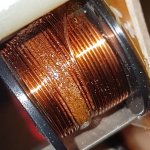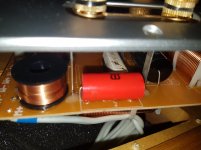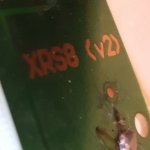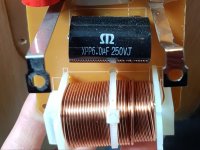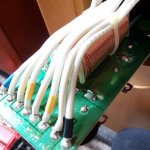Hi all and thanks for any help you may be able to offer.
I'm pretty novice in the world of DIY audio but would prefer it people dont try discourage me from trying anything.
I bought a set of speakers at a very good price and in my excitement to get the speakers at the great price and perhaps being overwhelmed by the incredible house I picked them up from I didn't really check them properly which I only have my self to blame.
However I digress, I got them back and realise the tweeters weren't working on all but 1 of the speakers. I sourced replacement tweeters, put one in and it worked fine, but on all the others only a very slight sound was produced from the tweeters. I had a look at one of the speakers and its clear that one of the coils on it has burnt. So from my limited knowledge my conclusion was that I need to replace that coil, and likely a good idea depending on cost to replace the capacitors given that the speakers have probably been over driven.
This led me to wonder, while I'm doing this, is it a good idea to try and upgrade the crossovers, and in this case how easily is this done and what need to be done?
Thanks for any help! Cheers, Mike.
I'm pretty novice in the world of DIY audio but would prefer it people dont try discourage me from trying anything.
I bought a set of speakers at a very good price and in my excitement to get the speakers at the great price and perhaps being overwhelmed by the incredible house I picked them up from I didn't really check them properly which I only have my self to blame.
However I digress, I got them back and realise the tweeters weren't working on all but 1 of the speakers. I sourced replacement tweeters, put one in and it worked fine, but on all the others only a very slight sound was produced from the tweeters. I had a look at one of the speakers and its clear that one of the coils on it has burnt. So from my limited knowledge my conclusion was that I need to replace that coil, and likely a good idea depending on cost to replace the capacitors given that the speakers have probably been over driven.
This led me to wonder, while I'm doing this, is it a good idea to try and upgrade the crossovers, and in this case how easily is this done and what need to be done?
Thanks for any help! Cheers, Mike.
Sure. You could start by drawing the circuit, and making minor changes like adjusting the tweeter level by changing a resistance value. Measuring can also come in to it.
Burnt coils, shorted turns are a bad thing. I'd want to get rid of all of those. Original values wouldn't be a bad place to start.
Some pictures might be cool, to show the effects? Also if you want help drawing the circuit.
Burnt coils, shorted turns are a bad thing. I'd want to get rid of all of those. Original values wouldn't be a bad place to start.
Some pictures might be cool, to show the effects? Also if you want help drawing the circuit.
Okay, from looking I can see they're monitor audios own capacitors. I rang them with regards to the coils but you can only buy the full crossover for 67 pounds. I've taken some preliminary photos but because of the way it's designed you can't see much without taking off the binding posts which I'll do later when I get time.
For now ideally I'd just like to get them working but I wasn't sure if there was a quick way to make upgrades to crossovers while I'm already changing things. I've definitely seen posts while searching around about the tweeters of people doing their own upgrades.
Will it be likely that its the coil causing the quiet tweeter or the capacitors? If MA don't sell the coil itself is it easy enough to buy direct replacements?
I'll try get some better photos later, most of the ones I took were too big to upload.
Cheers,
Mike
For now ideally I'd just like to get them working but I wasn't sure if there was a quick way to make upgrades to crossovers while I'm already changing things. I've definitely seen posts while searching around about the tweeters of people doing their own upgrades.
Will it be likely that its the coil causing the quiet tweeter or the capacitors? If MA don't sell the coil itself is it easy enough to buy direct replacements?
I'll try get some better photos later, most of the ones I took were too big to upload.
Cheers,
Mike
Attachments
Can't tell without looking at the circuit but it is possible. Yes, replacements should be easy enough if you can establish the values.Will it be likely that its the coil causing the quiet tweeter or the capacitors? If MA don't sell the coil itself is it easy enough to buy direct replacements?
It should be easier to see which coils are damaged now.
Your components look to be of good quality. I'd change the burned coils and tweeters and go from there.
Your components look to be of good quality. I'd change the burned coils and tweeters and go from there.
Is the value for the coil written underneath the coil itself as I can't see anything written anywhere currently visible.
I saw some people saying on a post that upgrading the caps to Mundorf MKPs can improve the sound the post was about 7 years old in fairness. Given the low cost of changing the caps I'm not against doing it but what is the likelihood of seeing noticeable change?
I saw some people saying on a post that upgrading the caps to Mundorf MKPs can improve the sound the post was about 7 years old in fairness. Given the low cost of changing the caps I'm not against doing it but what is the likelihood of seeing noticeable change?
Capacitors are the kinds of thing that the closer to perfect they are, the more they all sound the same. Some have a different parasitic resistance that may affect sound, but don't find out about this by accident and assume it's an upgrade. The capacitors you have appear to be polypropylene, which is a good choice.
You should try for yourself, but another view would be that a crossover upgrade involves finding a reason to change the component values or the circuit they are in.
I don't think you'll find the inductor values written on them. If one has survived you can measure that one. Or you can ask around for someone with these speakers or look around for a schematic. Last resort would be to guess based on dimensions.
You should try for yourself, but another view would be that a crossover upgrade involves finding a reason to change the component values or the circuit they are in.
I don't think you'll find the inductor values written on them. If one has survived you can measure that one. Or you can ask around for someone with these speakers or look around for a schematic. Last resort would be to guess based on dimensions.
Well alot of posts I've viewed regard them as being too bright but to be honest I'm happy with the overall sound so it's not worth changing them really. It was more if while I'm changing things a quick swap of something like a capacitor would make a difference I thought it might be worth a try. What is a good brand to use for the coils?
Also for future reference what do all the numbers been exactly on the cap?
For instance on the red one, the prefix PP?
Obviously the 4.0 micro F is self explanatory
But its then followed by 100VJ, I assume it's 100v but what's the J?
Also for future reference what do all the numbers been exactly on the cap?
For instance on the red one, the prefix PP?
Obviously the 4.0 micro F is self explanatory
But its then followed by 100VJ, I assume it's 100v but what's the J?
Thanks so much for your response Dissi, just seen that, is the something I could have got fairly easily by contacting monitor audio themselves? I'm not sure what it means by XRS8 V2 though.
Yes, Dissi has just made this a whole lot easier 😉
Capacitors also have markings regarding things like their Voltage rating, value tolerance, temperature rating, construction material (PP=polypropylene).
What about increasing the value of resistance a little, after you fix them. It might involve trying some values and then deciding which to go with.too bright .... a quick swap of something
Capacitors also have markings regarding things like their Voltage rating, value tolerance, temperature rating, construction material (PP=polypropylene).
All the inductors look good. There is glue on one inductor but it is just fine. Replacing 1.8 Ohm/7W resistor by 1.8 Ohm/12W Mills resistor if you want.
Okay I only assumed it was the coil as it looked like there was damage to it, I don't what a burnt coil looks like but my understanding was there is a transparent coating on them which can melt under high load. If you look at the coil I showed in my very first photo that's what it looks like rather than glue as you can see where it's bubbled up under the heat.
If its not the coil what is the most likely thing to cause a quiet tweeter?
Sorry I wasn't clear before, I'm actually fairly happy with it overall sound, it was other people, usually based from the measurements in the stereophile review of the RS6 which considers them too bright.
If its not the coil what is the most likely thing to cause a quiet tweeter?
Sorry I wasn't clear before, I'm actually fairly happy with it overall sound, it was other people, usually based from the measurements in the stereophile review of the RS6 which considers them too bright.
From the diagram
R1, L2 and C4 plus the associated tweeter wiring and connections.
Do you have a DVM to test continuity? A 1.5V battery just touched across the tweeter terminals should emit a sound to prove the tweeter is functional or you could swap between cabinets and test in the good cabinet.
R1, L2 and C4 plus the associated tweeter wiring and connections.
Do you have a DVM to test continuity? A 1.5V battery just touched across the tweeter terminals should emit a sound to prove the tweeter is functional or you could swap between cabinets and test in the good cabinet.
Yes, so I bought replacement tweeters as I checked the originals and they didn't get a reading for resistance, the new ones about 5ohms I think and interestingly made a click when I touched the multimeter to the terminals. But they're direct from MA so you'd hope they worked. So thinking that was the end of it installed the new tweeters then played a test tone and got a sound but a bit quiet. So checked it against the only working speaker to get a MUCH louder sound out the tweeter. I tried cleaning the connections to no avail.
So I decided the crossover could also have been damaged from being over driven do here I am.
So I decided the crossover could also have been damaged from being over driven do here I am.
to me it looks like the 7 watt / 1.8 ohm resistor in your pics are slightly burnt on its underside
Yeah it is, I opened up the other one earlier to check the other resistor and it's burnt as well. So that's the likely culprit then?
i would think that a burnt resistor would be dead and pass no signal throu it, but you can try bypass it with a short piece of wire and see if tweeter level increases, just to be sure
- Home
- Loudspeakers
- Multi-Way
- Monitor Audio RS8 Crossover Repair/Upgrade
